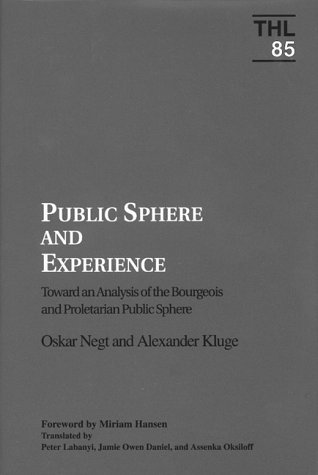Oskar Negt, Alexander Kluge: Public Sphere and Experience: Toward an Analysis of the Bourgeois and Proletarian Public Sphere (1972–)
Filed under book | Tags: · capitalism, mass media, politics, proletariat, public sphere, technology, television

“The ‘public sphere’ is widely debated in contemporary literary and cultural studies circles in the United States. The topic’s significance underscores the pressing problem of the location of these contemporary debates: Is the ‘public sphere’ a single authoritative and universal space in which the various positions in these debates compete for recognition, or does it consist of multiple local spaces spread over diverse collectivities? The term ‘public’ has emerged with new urgency in different disciplines and contexts history, cinema and television studies, art criticism, feminist, gay and lesbian, postcolonial, and subaltern perspectives, and is proliferating in titles of books, articles, and college courses. Public Sphere and Experience opens the discussion of the material conditions of experience into an arena that had previously figured only as an abstract term: the media of mass and consumer culture, in particular the so-called new media.”
Originally published as Öffentlichkeit und Erfahrung: Zur Organisationsanalyse von bürgerlicher und proletarischer Öffentlichkeit, 1972, Suhrkamp Verlag, Frankfurt
Translated by Peter Labanyi, Jamie Owen Daniel, and Assenka Oksiloff
Foreword by Miriam Hansen
Publisher University of Minnesota Press, 1993
Theory and History of Literature series, 85
ISBN 0816620318, 9780816620319
305 pages
PDF (7 MB)
Comment (1)Michael B. Schiffer: Power Struggles: Scientific Authority and the Creation of Practical Electricity Before Edison (2008)
Filed under book | Tags: · 1800s, electricity, electromagnetism, history of technology, light, technology

In 1882, Thomas Edison and his Edison Electric Light Company unveiled the first large-scale electrical system in the world to light a stretch of offices in a city. This was a monumental achievement, but it was not the beginning of the electrical age. The first electric generators were built in the 1830s, the earliest commercial lighting systems before 1860, and the first commercial application of generator-powered lights (in lighthouses) in the early 1860s. In Power Struggles, Michael Brian Schiffer examines some of these earlier efforts (both successful and unsuccessful) that paved the way for Edison.
After laying out a unified theoretical framework for understanding technological change, Schiffer presents a series of fascinating case studies of pre-Edison electrical technologies, including Volta’s electrochemical battery, Thomas Davenport’s electric motor, the first mechanical generators, Morse’s telegraph, the Atlantic cable, and the lighting of the dome of the U.S. Capitol. Schiffer discusses claims of “practicality” and “impracticality” (sometimes hotly contested) made for these technologies, and examines the central role of the scientific authority—in particular, the activities of Joseph Henry, mid-nineteenth-century America’s foremost scientist—in determining the fate of particular technologies.
These emerging electrical technologies formed the foundation of the modern industrial world. Schiffer shows how and why they became commercial products in the context of an evolving corporate capitalism in which conflicting judgments of practicality sometimes turned into power struggles.
Publisher MIT Press, 2008
Lemelson Center Studies in Invention and Innovation Series
ISBN 0262195828, 9780262195829
420 pages
Richard J. Aldrich: GCHQ: The Uncensored Story of Britain’s Most Secret Intelligence Agency (2010)
Filed under book | Tags: · code, cold war, computing, encryption, history, intelligence agency, surveillance, technology, united kingdom

The gripping inside story of the last unknown realm of the British secret service: GCHQ (Government Communication Headquarters).
GCHQ is the successor to the famous Bletchley Park wartime code-breaking organisation and is the largest and most secretive intelligence organisation in the country. During the war, it commanded more staff than MI5 and MI6 combined and has produced a number of intelligence triumphs, as well as some notable failures. Since the end of the Cold War, it has played a pivotal role in shaping Britain’s secret state. Still, we know almost nothing about it.
In this ground-breaking new book, Richard Aldrich traces GCHQ’s evolvement from a wartime code-breaking operation based in the Bedfordshire countryside, staffed by eccentric crossword puzzlers, to one of the world leading espionage organisations. It is packed full of dramatic spy stories that shed fresh light on Britain’s role in the Cold War – from the secret tunnels dug beneath Vienna and Berlin to tap Soviet phone lines, and daring submarine missions to gather intelligence from the Soviet fleet, to the notorious case of Geoffrey Pine, one of the most damaging moles ever recruited by the Soviets inside British intelligence. The book reveals for the first time how GCHQ operators based in Cheltenham affected the outcome of military confrontations in far-flung locations such as Indonesia and Malaya, and exposes the shocking case of three GGHQ workers who were killed in an infamous shootout with terrorists while working undercover in Turkey.
Today’s GCHQ struggles with some of the most difficult issues of our time. A leading force of the state’s security efforts against militant terrorist organisations like Al-Qaeda, they are also involved in fundamental issues that will mould the future of British society. Compelling and revelatory, Aldrich’s book is the crucial missing link in Britain’s intelligence history.
Publisher HarperPress, 2010
ISBN 0007278470, 9780007278473
666 pages
review (Richard Norton-Taylor, The Guardian)
review (Sinclair McKay, The Telegraph)
review (Duncan Campbell, New Statesman)
review (The Economist)

